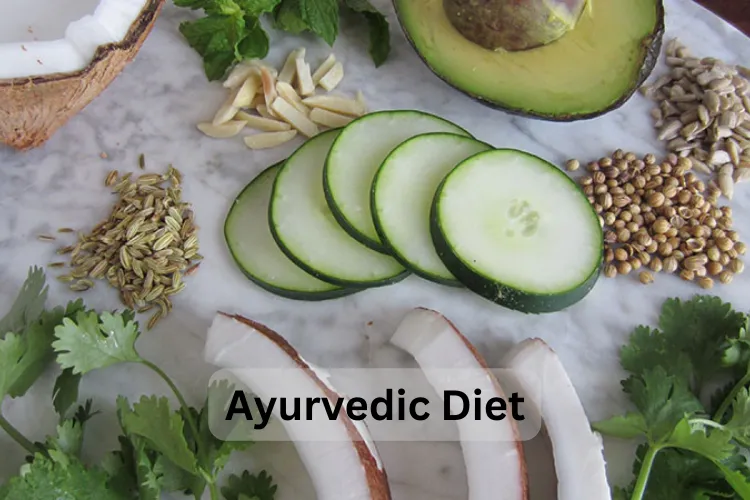Ayurvedic Diet: Types, Benefits and Correct Regimen

Table of Content
Which Diet are You Following These Days?
Whether an athlete, a film star, model, politician or even people having a sedentary lifestyle; all need food. Isn’t it! Based on your work and lifestyle there you may follow a certain diet. Nowadays we hear a lot about gluten-free diet, keto diet, Paleo diet, Vegan diet and so on. There is no end to it. The principle of each one is more or less similar. That is cut down on your calories by either skipping fatty food or doing fasting, etc. The main purpose of each of them is to give you a healthy and fit lifestyle.
But have you ever heard about a diet that is based on your dosha or body energy type? You might be thinking I am some old age thinking guy. Actually no! There is one diet for this and it is called “Ayurvedic Diet” The name itself is a self resemblance of its mirror image. Ayur means life and Vedic means scientific and of course diet is nothing but ahara. It’s all scientific. Let us go deep.
What is the Ayurvedic Diet?
People nowadays due to a dormant lifestyle suffer from obesity, liver problems, stomach ailments. Basically, their GIT ( Gastrointestinal Tract ) goes for a toss. We are living in an age of food and medicine adulteration. People are wary of the side effects. They want something safe and long-lasting. Here comes an Ayurvedic diet for you. We have already dissected the term. Ayurveda is a very ancient science that originated in India. Currently, it is spreading its roots in the western continents and gaining popularity. Gwyneth Paltrow, Shailene Woodly and Jennifer Aniston are a few of the western celebrities who follow this diet.
So how does this work? Any guesses! Have you read in the beginning about dosha and body energy type. If yes, then follow here. We have something called Dosha or the body energy type. There are three such kinds of dosha namely Pitta, Vatta and Kapha. Below a short description is given for each dosha and body energy type you may possess.
- Pitta: They are a combination of fire and water. Hard-working, diligent and clever. A native of such dosha will have mediumly build physiques, suffering from cardiac-related issues, indigestion or high blood pressure. They also have short tempers.
- Vata: They are the air element mixed with space creation. They are lightly built and have artistic and creative nature. They are likely to suffer from mild digestive issues but are prone to quick fatigue and anxiety.
- Kapha: They are heavily built and form the combination of earth and water. Generally calm and down to earth. They are likely to catch the issue of being obese, diabetes, depression and asthma.
While few say that they have all the three doshas, few say they have two doshas. Some of them even say that it is season-specific. If it is winter you are going to eat a lot of warm food, if it is summer then you eat food that is likely to cool your body. People sometimes may get frustrated and confused to find out their dosha. Do not get confused. You can always try our expert advice to get your dosha diet chart.
Find out your perfect Dosha and body energy type from our experts.
Ayurvedic food, according to many experts, will give you the right balance between a healthy and fruitful lifestyle. If you are following this kind of diet then you are eating less processed food and eating to fulfil your mind and heart rather than filling up the stomach. Few say if you follow the diet strictly, this will help in weight loss. But, there is very less scientific evidence of that. That is left up to you and try.
Type of Ayurvedic Food Habit According to the Dosha
Let us customise for you. According to the dosha, what you can eat is presented to you in a much simpler way.
Diet for Vatta
For Vatta Dosha follow these food habits:
- Protein: Regulated amount of poultry, meat, fish and seafood.
- Dairy Products: Milk, butter, yoghurt, cheese, ghee
- Fruits: Fleshy and ripened fruits such as bananas, mangoes, grapes, peaches and plums.
- Vegetables: Cooked underground vegetables like sweet potatoes, onion, radish, carrot and turnip.
- Legumes: Chickpeas, lentils, mung beans
- Grains: Cooked oats, cooked rice
- Nuts and Seeds: Any, including almonds, walnuts, pistachios, chia seeds, flax seeds, and sunflower seeds
- Herbs and Spices: Cardamom, ginger, cumin, basil, cloves, oregano, thyme, black pepper
Diet for Pitta
For Pitta follow these food habits:
- Protein: Egg whites. Avoid meat and beef.
- Dairy: Mild amount of milk, ghee and butter,
- Fruits: Fruits rich in vitamin B and C. Citrus fruits like orange and melons. Mangoes and pineapples will also do good.
- Vegetables: Good mix of sweet and bitter vegetables like sweet potatoes, carrots, cucumber, leafy vegetables like spinach and fenugreek.
- Legumes: Chickpeas, cereals, mung beans, black beans, rajma or kidney beans.
- Grains: Barley, oats, basmati rice, wheat
- Nuts and Seeds: small amounts of pumpkin seeds, flax seeds, sunflower seeds, coconut
- Herbs and Spices: small amounts of black pepper, cumin, cinnamon
Diet for Kapha
For Kapha follow these food habits:
- Proteins: Poultry in small amounts, seafood, egg whites
- Dairy: Skim milk, goat milk, soy milk
- Fruits: Apples, blueberries, pears, pomegranates, cherries, and dried fruit like raisins, figs, and prunes
- Vegetables: Asparagus, leafy greens, onions, potatoes, mushrooms, radishes, okra
- Legumes: Any, including black beans, chickpeas, lentils, and navy beans
- Grains: Oats, rye, buckwheat, barley, corn, millet
- Nuts and Seeds: small amounts of pumpkin seeds, sunflower seeds, flax seeds
- Herbs and Spices: any, including cumin, black pepper, turmeric, ginger, cinnamon, basil, oregano, and thyme
Choosing the correct ayurvedic diet plan is very important or else this can have a negative effect also. People often face leukoderma which can be due to the wrong diet.
What Can be the Benefits of Such a Diet?
There are a few potential benefits of an Ayurvedic diet.
First and foremost, we tend to sway away from processed food. Less chance of adulteration. Ayurvedic food will stimulate you to eat whole fruits, grains, cereals, vegetables or legumes. This will benefit your digestive system because you are adding more fibre to your diet. Unprocessed or whole food will keep the vitamins and minerals intact which goes away in the processed food.
High fibre food will help in weight loss, decrease blood pressure and people tend to suffer less from a terminal disease and sometimes prevent ageing too.
It will in the long run promote understanding and maturity. It may increase concentration power. People tend to be more attentive. People can control their distractions while eating and they focus on the smell and taste of food thereby enjoying them and filling the mind with pleasure.
Our online therapist helps you with all kinds of wellness problems. Talk to them now.
Potential Downsides!!!
One of the major reasons the Ayurvedic diet has not reached its full potential and become famous because it gets confusing for people to choose their dosha. Not only the food habits, but the timing and the schedule also create confusion and people tend to become intrigued.
When to eat? How much to eat? In which season to eat? How to eat? So many questions and literally jam your mind. This will be true for most of the new followers. Change in the season will also decide the fate of the food which we are eating. So, best of luck guys.
Because you are eating a certain kind of food and will have to avoid the other one which you may like to eat, you may feel it’s restrictive. You may feel this is some kind of punishment. The ayurvedic diet generally will not have a cheat day. So, it is a strict diet routine. If you like non-veg are made to eat veg. Then forget about the non-veg.
Choosing the right type is very important because if you choose the wrong diet as per dosha this can impact your health in a negative way too.
Conclusion
Having said that, there are many questions that may brew into your mind. Is the Ayurvedic Diet healthy? Which type of dosha to follow? What to eat in the morning and what in the evening?
if you want to practice this Ayurvedic diet and do not want to falter in the first step. Connect with our expert therapists right now.
















